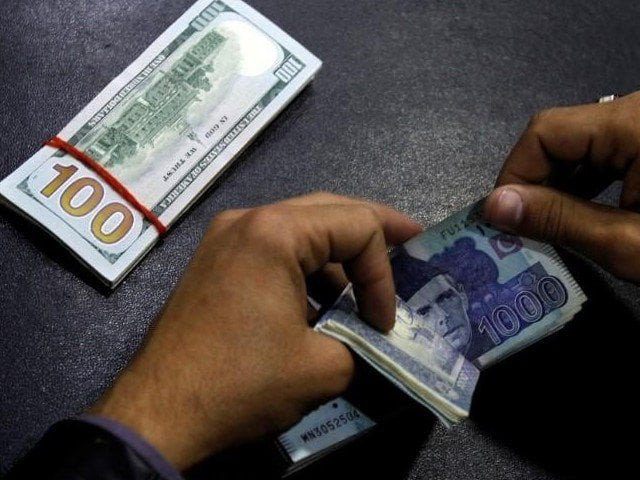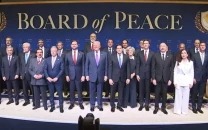Govt to borrow Rs400b from banking consortium
Loan to be used to pay off circular debt, provinces' net hydel profit

Country's outstanding circular debt surging to record Rs1.41tr. PHOTO: EXPRESS/FILE
The Economic Coordination Committee (ECC) of the Cabinet approved the term sheet for raising Rs200 billion from commercial banks at an interest rate of around 11.3% by floating the ten-year Pakistan Energy Sukuk bonds. The decision to borrow Rs200 billion was taken in November last year.
This loan, obtained by pledging the assets of the power distribution and generation companies, will be utilised to pay off circular debt and net hydle profit to Khyber Pakhtunkhwa and Punjab. The ECC also directed the Ministry of Energy to explore the possibility of getting another Rs200 billion in loans.
The ECC allowed the Ministry of Energy to proceed with the raising of syndicated Islamic Term Finance Facility of Rs200 billion for which term sheet had already been received from a Consortium of Islamic Banks, said a Finance Ministry handout.
The Ministry of Energy also gave a detailed presentation on the current situation of circular debt and the components that have contributed to its buildup. The ECC was informed that as of end December the circular debt had increased to Rs807.9 billion.
This included Rs124.3 billion payables to the government owned generation companies, Rs493.8 billion to the Independent Power Producers, Rs169.5 billion to Wapda and Rs20 billion to the National Tariff and Dispatch Company. In addition to this, Rs607 billion have already been parked in the Power Holding Private Limited, taking total payables to the power sector to Rs1.42 trillion.
The power sector receivables also crossed Rs1 trillion by end of November 2018, according to the Energy Ministry. This included Rs170.4 billion subsidies that the Finance Ministry owes to them. The private sector is the single largest defaulter, owning Rs451 billion to the power distribution companies.
The alarming financial position suggests that the government needs to undertake immediate corrective measures. The ECC directed the Finance Ministry to reconcile the subsidies amount with the Power Division. It also asked the Power Division to lower its line losses by 1.5% in this fiscal year.
The ECC approved the terms and conditions offered by a consortium of Meezan Bank Limited (MBL), Faysal Bank Limited (FBL), BankIslami Pakistan Limited (BIPL), Dubai Islamic Bank Pakistan Limited (DIBPL), MCB Islamic Bank Limited (MIB) and Al Baraka Bank Pakistan (ABPL).
The MBL has offered Rs88 billion, FBL Rs35 billion, BIPL also Rs35 billion, DIBPL Rs14.15 billion, MIB Rs10 billion, ABPL Rs8.9 billion and other banks Rs9 billion. The ten-year Pakistan Energy Sukuk will be a redeemable capital instrument under Section 66 of the Companies Act of 2017 with a face value of Rs100,000.
The PHPL will pay first rental installment of Rs25 billion at the end of six month from the bullet payment date. The profit rate is six-month KIBOR plus 80 basis points per annum, which comes to around 11.3%.
In case, the PHPL fails to make timely payments of interest rates, it will pay additional amount calculated at 120 basis points per annum to the investors, according to the term sheet.
The government will pledge the assets of Wapda, Genco holding company and power distribution companies of Peshawar, Islamabad, Gujranwala, Lahore, Faisalabad and Multan. The Finance Ministry will provide guarantees to investors for ensuring repayments of the principal as well as interest rates.
The interest payments will be made out of an Escrow account of the Central Power Purchase Agency. The Sukuk will also be declared as the SLR eligible. All the transaction related expenses will also be borne by the PHPL.
The ECC approved Ministry of National Food Security's proposal for allowing the export of 500,000 metric tons of surplus wheat/ wheat products by PASSCO for which it had received tenders.
The decision was made in view of the rising prices of wheat in the international markets, sufficient available stocks (1.7 million tons) and the predictions of a good crop in the current crop season.
The Ministry of Information Technology briefed the meeting on the annual budget of the National Telecom Corporation (NTC). The committee directed the IT ministry to address the NTC's management issues on priority, in view of the unsatisfactory responses to the queries raised by members of the ECC.



















COMMENTS
Comments are moderated and generally will be posted if they are on-topic and not abusive.
For more information, please see our Comments FAQ